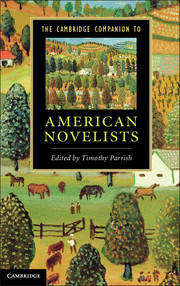Book contents
- Frontmatter
- Contents
- Contributors
- Introduction
- 1 James Fenimore Cooper
- 2 Nathaniel Hawthorne
- 3 Herman Melville
- 4 Harriet Beecher Stowe
- 5 Mark Twain
- 6 Henry James
- 7 Edith Wharton
- 8 Theodore Dreiser
- 9 Willa Cather
- 10 F. Scott Fitzgerald
- 11 Ernest Hemingway
- 12 William Faulkner
- 13 Henry Roth
- 14 Djuna Barnes
- 15 Zora Neale Hurston
- 16 Richard Wright
- 17 Raymond Chandler
- 18 Ralph Ellison
- 19 J. D. Salinger
- 20 Patricia Highsmith
- 21 Vladimir Nabokov
- 22 Jack Kerouac
- 23 Saul Bellow
- 24 Kurt Vonnegut
- 25 John Updike
- 26 Thomas Pynchon
- 27 Toni Morrison
- 28 Philip Roth
- 29 Don DeLillo
- 30 Cormac McCarthy
- Guide to Further Reading
- Index
- References
8 - Theodore Dreiser
Published online by Cambridge University Press: 05 December 2012
- Frontmatter
- Contents
- Contributors
- Introduction
- 1 James Fenimore Cooper
- 2 Nathaniel Hawthorne
- 3 Herman Melville
- 4 Harriet Beecher Stowe
- 5 Mark Twain
- 6 Henry James
- 7 Edith Wharton
- 8 Theodore Dreiser
- 9 Willa Cather
- 10 F. Scott Fitzgerald
- 11 Ernest Hemingway
- 12 William Faulkner
- 13 Henry Roth
- 14 Djuna Barnes
- 15 Zora Neale Hurston
- 16 Richard Wright
- 17 Raymond Chandler
- 18 Ralph Ellison
- 19 J. D. Salinger
- 20 Patricia Highsmith
- 21 Vladimir Nabokov
- 22 Jack Kerouac
- 23 Saul Bellow
- 24 Kurt Vonnegut
- 25 John Updike
- 26 Thomas Pynchon
- 27 Toni Morrison
- 28 Philip Roth
- 29 Don DeLillo
- 30 Cormac McCarthy
- Guide to Further Reading
- Index
- References
Summary
One of the most famous, though possibly apocryphal, conversations in American literary history took place between Ernest Hemingway and F. Scott Fitzgerald. According to legend, Fitzgerald remarked, “The rich are very different from you and me,” to which Hemingway replied, “Yes – they have more money.” Theodore Dreiser (1871–1945) fuses those contradictory attitudes. Few have written more probingly about wealth than Dreiser, and his perspective ranges from awestruck to outraged. The power of his writing results from his completely understanding – and having lived – the most familiar iteration of the American Dream: a young man from a poor, socially marginal family transcends his origins by hard work and singular talent, leading ultimately to success and even, in Dreiser’s case, international celebrity. Dreiser is the consummate chronicler of that mythic American ascent narrative because he understands to his core the allure of money – while also providing unsurpassed critical analysis of it. Loving chronicler and fierce critic of the national obsession with wealth, Dreiser uses the quest for money to examine the meaning of America.
In a famous scene in Dreiser’s debut novel Sister Carrie (1900), the title character strolls down Broadway with her friend Mrs. Vance. A “showy parade” of people “going purposely to see and be seen” all wear “the latest they could afford.” Even the not-particularly-well-dressed “Carrie found herself stared at and ogled,” suggesting the close relationship between displaying what one owns and attracting the opposite sex (another important Dreiserian theme, to which we will return), a point magnified by her sensing around her a “heavy percentage of vice,” implying that prostitutes are strutting on Broadway along with the wealthy and the wanna-bes. Dreiser ends the chapter by swooping down from this wide-angled panorama to a close-up: Carrie “felt that she was not of it.” A sense of personal inadequacy reawakens her slumbering ambition: “She longed to feel the delight of parading here as an equal. Ah, then she would be happy!” Equality is determined by having enough money to exhibit oneself effectively.
- Type
- Chapter
- Information
- The Cambridge Companion to American Novelists , pp. 72 - 81Publisher: Cambridge University PressPrint publication year: 2012



